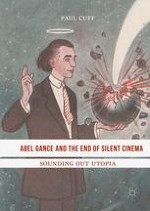2016 | OriginalPaper | Buchkapitel
2. Towards Utopia
verfasst von : Paul Cuff
Erschienen in: Abel Gance and the End of Silent Cinema
Aktivieren Sie unsere intelligente Suche, um passende Fachinhalte oder Patente zu finden.
Wählen Sie Textabschnitte aus um mit Künstlicher Intelligenz passenden Patente zu finden. powered by
Markieren Sie Textabschnitte, um KI-gestützt weitere passende Inhalte zu finden. powered by
